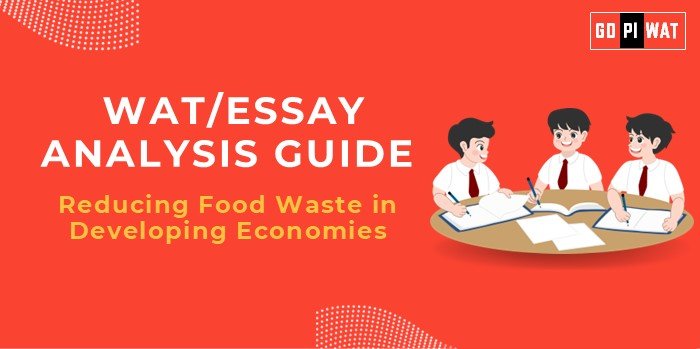📋 Written Ability Test (WAT) / Essay Analysis Guide: Reducing Food Waste in Developing Economies
🌍 Understanding the Topic’s Importance
Food waste is central to discussions on sustainability, poverty alleviation, and economic growth in developing economies. Its reduction aligns with global goals like the UN’s SDG 12 (Responsible Consumption and Production).
⏳ Effective Planning and Writing
- 🧠 Time Allocation:
- Planning: 5 minutes.
- Writing: 20 minutes.
- Review: 5 minutes.
- 📋 Preparation Tips:
- Note key statistics, stakeholders, and case studies.
- Organize arguments into achievements, challenges, and recommendations.
💡 Introduction Techniques for Essays
- 🌍 Contrast Approach:
“While millions go hungry in developing economies, up to 40% of food is wasted—a paradox that demands urgent solutions.” - 🔧 Solution-Based:
“Improved supply chains and cold storage facilities can bridge the gap between food surplus and hunger in developing economies.”
📚 Structuring the Essay Body
- 🏆 Achievements:
- Highlight successful food redistribution programs and government schemes.
- Example: Kenya’s cold storage systems reduced food losses by 30%.
- ⚠️ Challenges:
- Discuss gaps in infrastructure, policy, and consumer behavior.
- Include data: “40% of food wasted in India costs ₹92,000 crore annually.”
- 🚀 Future Outlook:
- Suggest innovations like blockchain for supply chain management.
- Discuss policy changes inspired by France’s anti-food waste laws.
🎯 Concluding Effectively
- ⚖️ Balanced Perspective:
“While progress in reducing food waste is visible, a holistic approach involving infrastructure, policy, and awareness is necessary.” - 🌏 Global Comparison:
“Learning from nations like France and Rwanda, developing economies can create sustainable food systems.”
🔍 Analyzing Successes and Shortcomings
- 🏆 Achievements: Redistribution programs, cold storage advancements.
- ⚠️ Challenges: Lack of awareness, policy enforcement issues.
- 🌏 Global Context: France’s anti-food waste legislation, Rwanda’s farm systems.
🔧 Recommendations for Sustainable Progress
- 🤝 Establish Public-Private Partnerships: Fund cold storage and transport systems.
- 📜 Implement Stringent Anti-Food Waste Laws: Enforce laws to minimize food wastage across supply chains.
- 📚 Promote Awareness Campaigns: Educate consumers and industries about food waste and its impact.
✍️ Sample Short Essays
- ⚖️ Balanced Perspective:
“Food waste in developing economies underscores a systemic failure to optimize resources. While technology and infrastructure can reduce waste, consumer behavior and policy reforms are equally important.” - 💡 Solution-Oriented:
“Reducing food waste in developing economies requires investments in cold storage, food processing, and redistribution. Collaborative efforts among governments, private entities, and consumers can create sustainable food systems.” - 🌏 Global Comparison:
“France’s success with anti-food waste laws offers a model for developing economies. Integrating policy with technology and awareness campaigns can bridge the gap between food surplus and scarcity.”


